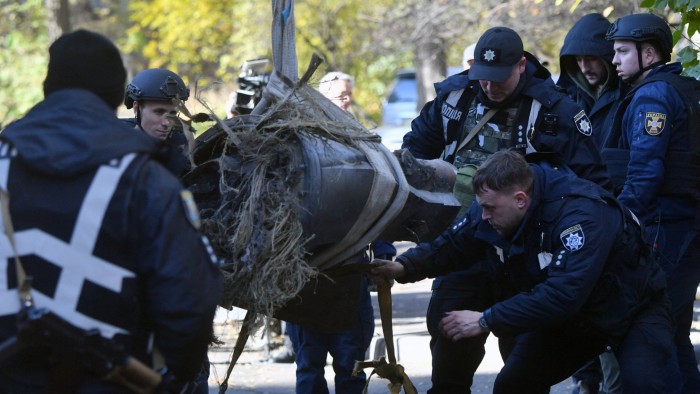Joe Biden’s overdue missile consent for Ukraine

Unlock the White House Watch newsletter for free
Your guide to what the 2024 US election means for Washington and the world
From heavy artillery to fighter jets, each shift by the Biden administration to provide Ukraine with more potent weaponry has traced a similar path. Months of soul-searching about possible Russian escalation are followed by a belated go-ahead. So it is with Washington’s consent for Kyiv to launch strikes into Russia using US-made long-range missiles. This is welcome — but would have been better if it had come sooner, and with fewer restrictions; permission reportedly extends, for now, only to the Ukrainian-occupied Kursk region of Russia. It should also be only one element of a broader effort by America and its allies to bolster Ukraine’s position on the battlefield before Donald Trump’s inauguration as president.
Paradoxically, Trump’s vow to stop the fighting in Ukraine once he is president will make the intervening weeks only more hazardous. Both sides will be battling to strengthen their hand ahead of any negotiations. Russia has already begun, by stepping up its bombardment of Kyiv’s energy infrastructure — including an attack on Sunday that was one of the largest of the war.
Moscow has also provocatively deployed 10,000 North Korean troops to Kursk, engaging third-country soldiers in the conflict in a far more direct manner than US personnel may be involved in targeting long-range missiles for Kyiv. Large portions of Russia’s weapons are already provided by North Korea or Iran. The Kremlin’s claim that it is Washington, with its missiles permission, that is “pouring fuel on the fire” is arrant hypocrisy.
It is unfortunate that by tarrying so long to reach the right decision, the Biden White House has again appeared irresolute and reactive. It argued in recent months that there was little to gain from permitting Ukrainian strikes inside Russia since Moscow had already moved the bombers Kyiv hoped to strike out of range. But there are other vital military targets, including arms and fuel depots, command and control and logistics facilities, that Ukraine can now hit far more effectively with western-made missiles than with its own drones. Biden’s move also sends a valuable message to Moscow, and indeed Pyongyang, that his administration is not sitting back and waiting for Trump.
Moscow has engaged in loud sabre-rattling in the hope of deterring Washington, including revising its nuclear doctrine. Any boost to Ukraine’s capabilities risks a Russian response; Moscow may now, as it has hinted, arm US adversaries such as Houthi rebels, or step up covert sabotage elsewhere. But it is unlikely to jump several rungs up the ladder of escalation at once.
The task for Ukraine’s allies in coming weeks is to enable Kyiv to withstand new onslaughts from Moscow, put it in the strongest position for talks — and increase the incentive for Russia’s leader to accept a deal that would preserve Ukraine’s viability. There seems little reason for the UK and France not to give their own authorisations to Kyiv to use their Storm Shadow and Scalp missiles on Russian targets, after months of urging Biden to back them. Germany’s chancellor, Olaf Scholz, should do the same with German Taurus missiles. The Biden administration is right to step up efforts to rush out $6bn of security assistance for Ukraine still remaining from the $61bn package agreed by Congress in April.
European allies should make preparations to take over America’s share of financing Ukraine’s war effort, in case Trump’s dealmaking efforts fail but he withdraws US support to Kyiv. The US president-elect has said he would secure “peace through strength”. To maximise the chances of a just peace for Ukraine, western backers need meanwhile to demonstrate that strength.
#Joe #Bidens #overdue #missile #consent #Ukraine



